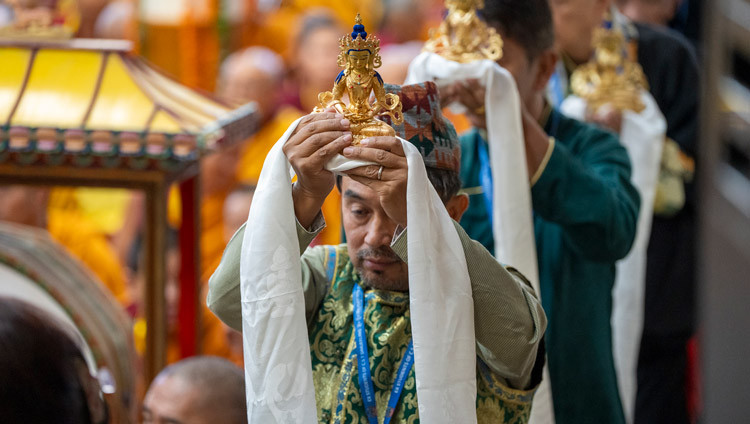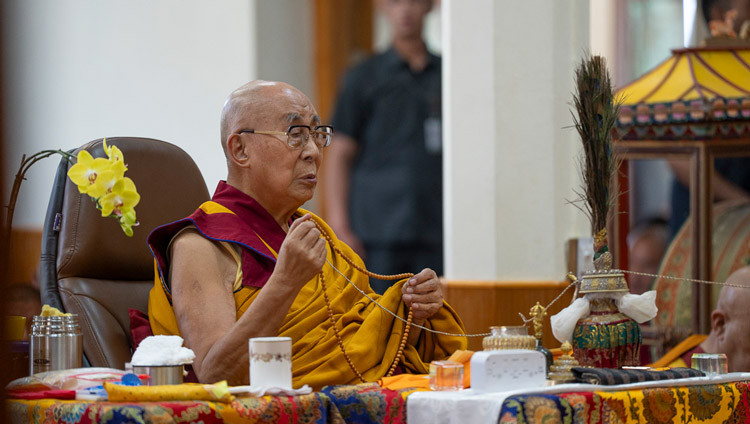Visiting Spring Dales Public School in Mulbekh
July 26, 2018
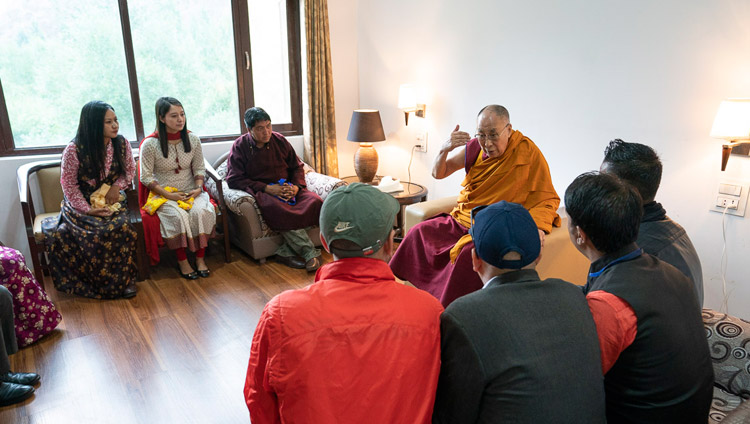
“As a human being I’m aware that we are all physically, mentally and emotionally the same and we all want to live a happy life. Scientists say our basic nature is compassionate. It’s clear that love and affection bring people together. Even animals show limited altruism towards their companions. Elephants seem to mourn when one of the herd dies.
“Most of us enjoy tremendous love and affection from our mothers when we are born. And it’s from her that we receive the first seed of compassion. Irrespective of whether we have faith in religion or not, it’s good to be more compassionate. It makes us happier as individuals with a positive influence on our families and the neighbourhood where we live. When someone who has lived a kind life dies, people miss them and say so. But when an angry, greedily ambitious, ruthless person dies, there’s a sense of relief. So, I try to practise warm-heartedness wherever I go.
“My second commitment is to encouraging inter-religious harmony and the third is to protect the natural environment. These are areas where I think members of the media have a responsibility to alert and educate the public.”
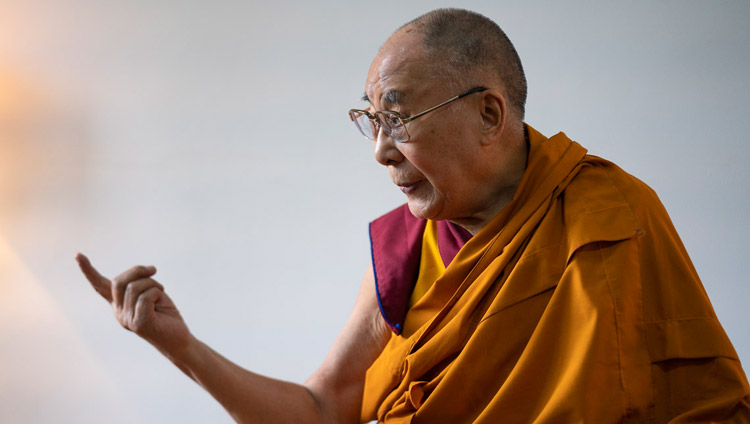
The first questioner told His Holiness how happy people were that he was making his second visit to Kargil. He replied that he had been impressed and touched by the close attention people had paid to what he said in Hussaini Park yesterday. He mentioned discussions he has had recently about the possibility of convening an All India Muslim Conference, with a view to sharing with Muslim brothers and sisters in other parts of the world how Muslims in India live in harmony among other faiths and how there is no quarrel between Sunni and Shia branches of Islam.
A young woman asked about friendship and His Holiness told her that real, lasting friendship is based on trust and trust grows when you show concern for others’ well being. He recalled the advice of a Christian priest he knows, a marriage guidance counsellor, who told him he often advises couples not to rush into marriage, but to get to know each other first. Developing trust and respect for one another is a much sounder basis for lasting marriage than simple physical attraction.
With regard to settling conflict in the world, His Holiness was firm in opposing the use of force and encouraging dialogue.
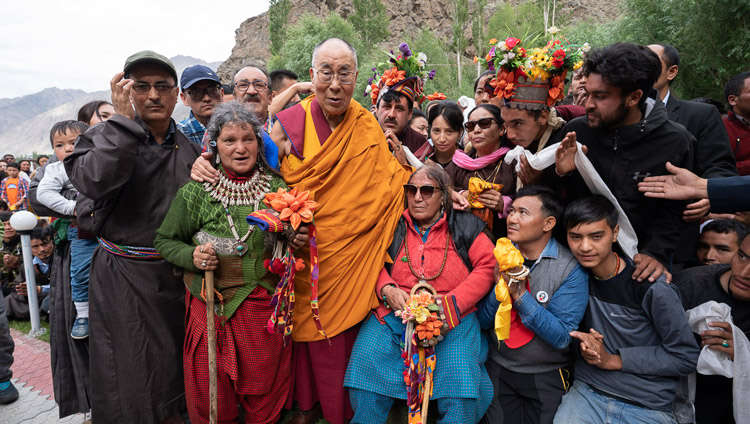
Speaking to a group of Buddhists from Kargil on the lawn outside the hotel His Holiness remarked that among the many different religious traditions the Nalanda Tradition is notable for its use of reason, logic and analytical thinking. The Buddha, he said, encouraged scepticism when he told his followers not to accept what he said on faith, but to examine it as a goldsmith tests gold and to accept it only after they had proved its worth.
“All religious traditions are capable of helping individuals become better people because they convey a common message of the value of love and compassion, tolerance and forgiveness. Theistic faiths believe in a creator god, non-theistic traditions like Jainism and Buddhism do not and take a different approach. They stress personal responsibility and the importance of training our minds and reducing destructive emotions like anger, hatred and jealousy.
“Buddhist literature contains a rich understanding of the workings of the mind and how to tackle such destructive emotions. I try to let people know that material development alone is no guarantee of happiness—the key factor is peace of mind. As followers of Buddha Shakyamuni we would do well to pay closer attention to his teaching and transform our minds.
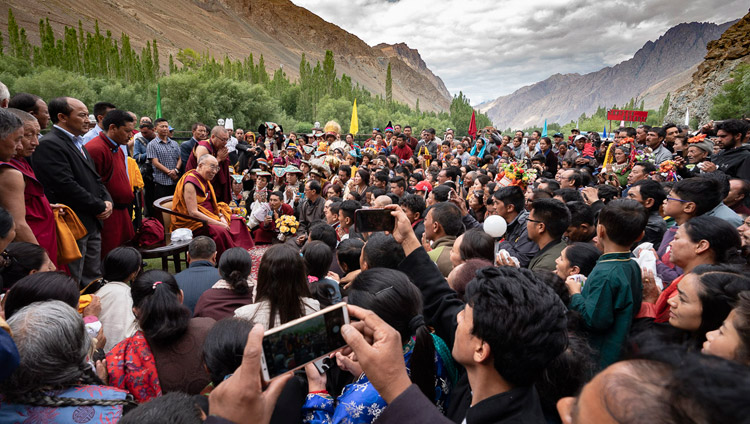
“The 8th century Nalanda master, Shantideva, wrote the ‘Guide to the Bodhisattva’s Way of Life’, and I have closely followed the advice it contains and transformed my own emotions. Chapter six, dealing with patience, has invaluable advice about reducing anger. Chapter eight discusses why and how we can develop the awakening mind of bodhichitta.”
His Holiness handed out several copies of the book in English and Hindi translations.
“We Buddhists should be 21st century Buddhists, relying less on faith, but more on understanding the way the mind works. The Tawang Foundation has recently resolved to spread centres of learning along the Himalayan region from Ladakh to Tawang in existing temples, monasteries and nunneries. They have my full support.”
His Holiness drove about 40kms from Kargil to the Spring Dales Public School established in 1992 in Mulbekh. His Holiness was escorted to his seat on a covered stage overlooking the school ground, where the 230 students, their parents and relatives, school staff and interested members of the public were gathered.
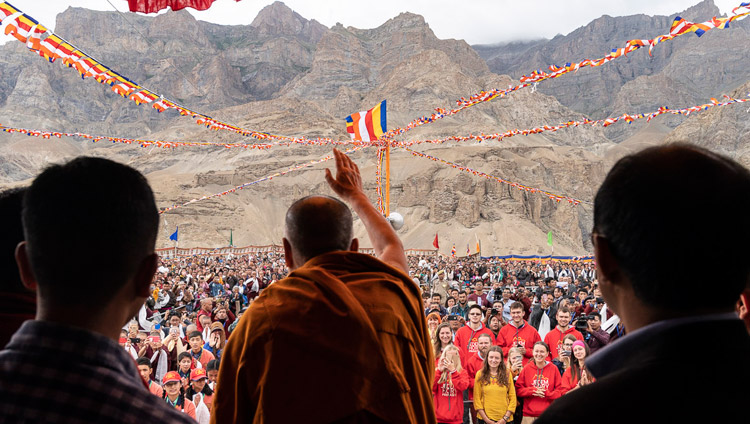
Principal Norboo was effusive in his welcome. He told His Holiness how much they regretted it when bad weather prevented his coming to see the school in 2014. But they did not give up hope and were grateful when Chairman Haji Ali invited him to Kargil and facilitated his coming to Mulbekh. The Principal reported that the school and its teachers are convinced that if they offer a holistic education in a friendly and caring environment, students will learn to use their innate creativity for their own and others’ benefit.
He expressed gratitude for the support the school has received from the Dalai Lama Trust, especially for its hostel project which is expected to greatly extend the school’s activities in the cold winter months. He concluded, “We are dedicated to providing children with a good quality education and thank Your Holiness for your encouragement and support.”
His Holiness declared his appreciation of the Principal’s report: “You are trying to put in practice what I talk about, so I don’t have much to add.
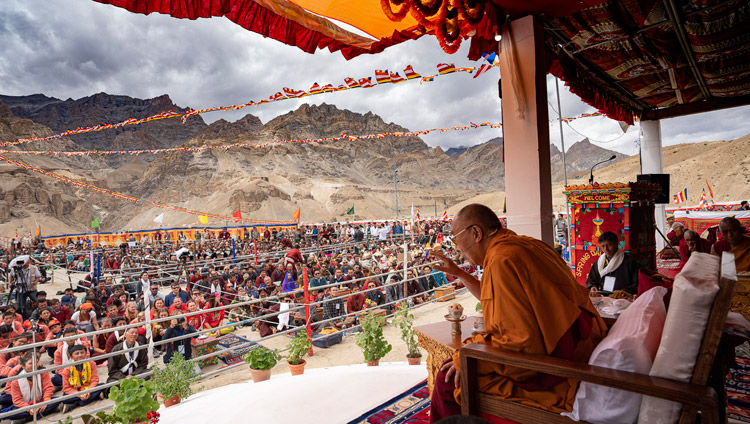
“We are now in the 21st century and when we look back on the last century it seems to have been filled with suffering and war. Whereas I belong to the 20th century, you students here belong to the 21st. Nowadays, we see crises in the world due to old ways of thinking—primarily the use of weapons and force to solve problems. Although attitudes changed later, in the earlier part of the 20th century people were proud of their powerful armies, just as they were later proud of their nuclear weapons.
“After the Second World War, however, people began to appreciate the importance of peace. The French and German leaders, de Gaulle and Adenauer worked to establish what has become the European Union, and peace has prevailed in Europe since then as a result. This spirit of promoting the common good over narrow national interest is something I really admire.
“Also following the Second World War, an anti-nuclear movement emerged led by Japan. I’ve been to Hiroshima and Nagasaki where these shocking weapons were used. More recently, during the Iraq crisis, many people in many different parts of the world marched in protest against violence and war.
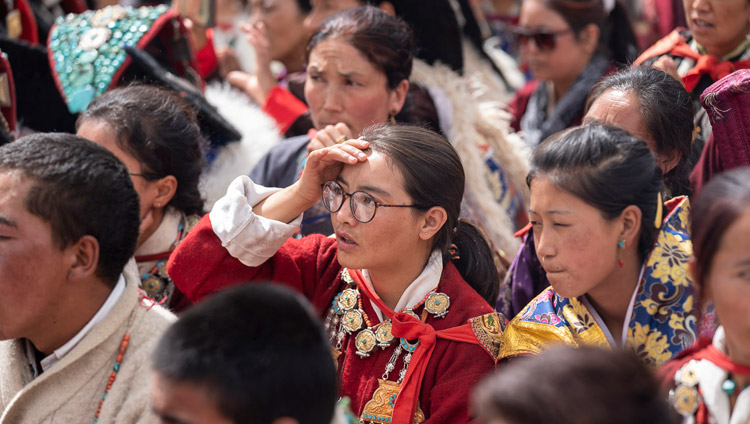
“Meeting volunteers here from the Czech Republic reminded me of President Vaclav Havel, who supported such peace movements. When Czechoslovakia became independent and free of Soviet domination he invited me to the celebrations. He was someone I really admired. His death was a great loss. We need more leaders like him.
“Here in India, Mahatma Gandhi pursued the freedom struggle through non-violence. He learned how to implement the ancient Indian practice of ahimsa in a political context.
“At the time of the Iraq crisis, I was asked to go to Baghdad to mediate, but I didn’t feel I had any connections to be effective. I wrote to President Havel suggesting that a delegation of, for example, Nobel Peace Laureates, representing no government, just the interests of peace, might have been able to influence events. I still think war could have been avoided.
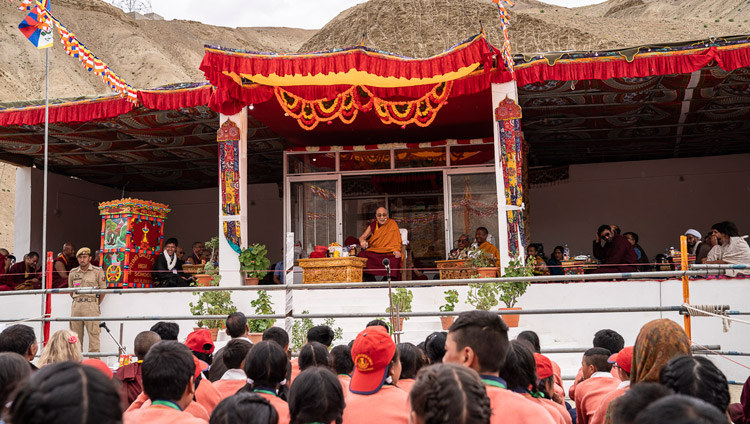
“After the September 11th event in New York and Washington, I wrote to President Bush offering my prayers and condolences. I also expressed the hope that any response would be non-violent. I said, ‘Today there is one Bin Laden, but if you resort to violence and the use of force you risk creating a hundred Bin Ladens.’ Violence provokes counter violence in an unending cycle.”
His Holiness observed that there will always be disagreements between human beings as a result of different ideas, but the way to resolve them is through dialogue. He stressed the need to make this a peaceful century by acknowledging that we all belong to the human community, but also remembering that peace starts on an individual level.
He noted that human beings are social animals and that it is love that brings us together, while anger drives us apart. Scientists have shown that where constant anger and hatred undermine our immune systems, compassion strengthens our general well-being. His Holiness remarked that this is not about the next life, heaven or nirvana. To live more peacefully and joyfully in our day to day lives, we need a warm heart.
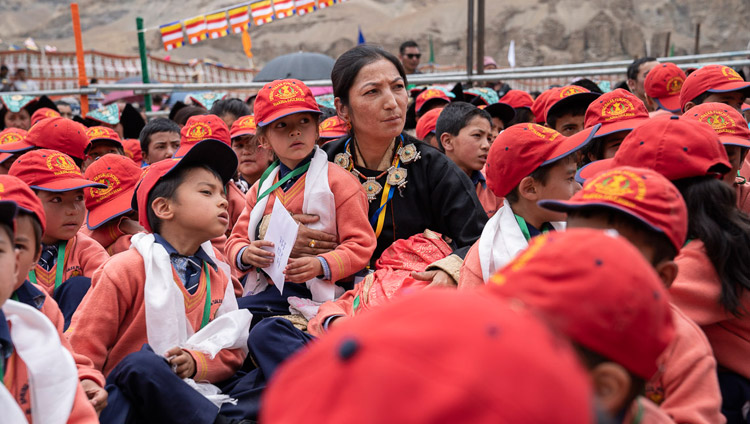
“These are some of the things I’ve observed. I belong to the 20th century, but those of you of the 21st century generation need to take account of the whole world. Try to make this century an era of peace. Modern education should pay attention to how to develop inner peace. Just as we need to be physically fit, we need to be mentally fit as well. And just as we learn to maintain physical hygiene to maintain our health, we also need emotional hygiene that involves tackling our destructive emotions.
“Many of the problems we face today are our own creation. Creating a more peaceful world requires a peaceful mind and a peaceful heart. As human brothers and sisters we must live together in tolerance and affection. One of the steps we can take is to encourage inter-religious harmony. India can show the world that it’s possible for the world’s religious traditions to live together in friendship and respect”
His Holiness also spoke of the threat of climate change and the urgency of taking greater care of the environment. He reported that snowfall in Dharamsala over the last 60 years has been steadily declining. The result will be a shortage of water. He recalled that when he was in Tibet everyone took pure water for granted. It was only in exile that he learned that due to pollution some water is not fit to drink. However, he said, remedial steps can meet with success. At one point rivers in Stockholm, Sweden, were so polluted there were no more fish in them, but after efforts to eliminate pollution, fish have returned.
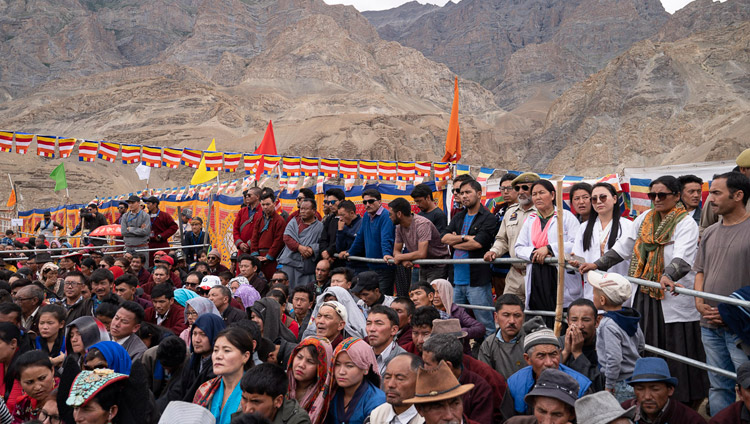
Finally, His Holiness asserted that he is a Buddhist, a student of the Nalanda Tradition that has taught him about critical intelligence.
“The Buddha was a great teacher, but he was also a great thinker, a philosopher, who encouraged reason and experiment. Nagarjuna, Aryadeva, Buddhapalita. Chandrakirti, Dignaga and Dharmakirti were also great philosophers. We still study what they wrote. Most of the more than 300 volumes of the Kangyur and Tengyur consist of translations of Indian texts. During the process of translation the Tibetan language was enriched and refined. Consequently, today it is the most accurate medium for explaining Buddhist philosophy and psychology. Therefore, it’s worthwhile knowing Tibetan. Today, even Chinese scholars appreciate the scientific approach of the Nalanda Tradition we kept alive in Tibet.”
His Holiness concluded by giving the children the transmission of the ‘Praise to Manjushri’ and his mantra. He reiterated the importance of education telling the audience that without education you cannot develop.
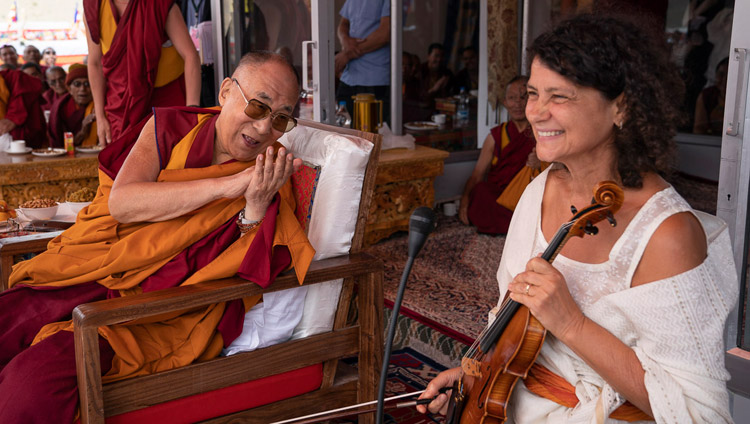
His Holiness joined the Spring Dales students in singing the ‘Prayer of the Words of Truth’, following which Czech musician Iva Bittova performed a traditional Czech song.
After lunch with invited guests, His Holiness viewed the new hostel block and posed for photographs with students, Czech volunteers, teachers and staff before driving back to Kargil. Tomorrow, he will return to Leh.



